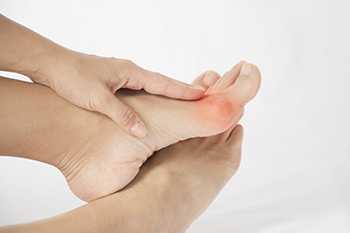
Even if you are unfamiliar with the field of podiatry, you might have already heard about the foot condition known as bunions. Bunions are a kind of bony bump that can form on the outer side of the big toe. There are many ways to treat a bunion and they often depend on the severity of the patient’s case. For example, a podiatrist might recommend a surgical procedure if the bunion is particularly severe. A surgical procedure might be effective in treating bunions because it realigns the joints and removes the bony growth. If you are suffering from significant pain from the bunion or a toe deformity, this might be an indication that surgery be considered. Importantly, there are many types of bunion surgeries, including a bunionectomy and osteotomy. If you are currently living with a bunion, it is suggested that you contact a podiatrist for more information about treatment options.
If you are suffering from bunions, contact one of our podiatrists of New England Foot and Ankle. Our doctors can provide the care you need to keep you pain-free and on your feet.
What Is a Bunion?
A bunion is formed of swollen tissue or an enlargement of boney growth, usually located at the base joint of the toe that connects to the foot. The swelling occurs due to the bones in the big toe shifting inward, which impacts the other toes of the foot. This causes the area around the base of the big toe to become inflamed and painful.
Why Do Bunions Form?
Genetics – Susceptibility to bunions are often hereditary
Stress on the feet – Poorly fitted and uncomfortable footwear that places stress on feet, such as heels, can worsen existing bunions
How Are Bunions Diagnosed?
Doctors often perform two tests – blood tests and x-rays – when trying to diagnose bunions, especially in the early stages of development. Blood tests help determine if the foot pain is being caused by something else, such as arthritis, while x-rays provide a clear picture of your bone structure to your doctor.
How Are Bunions Treated?
- Refrain from wearing heels or similar shoes that cause discomfort
- Select wider shoes that can provide more comfort and reduce pain
- Anti-inflammatory and pain management drugs
- Orthotics or foot inserts
- Surgery
If you have any questions, please feel free to contact one of our offices located in Chelmsford and Newburyport, MA . We offer the newest diagnostic and treatment technologies for all your foot care needs.
